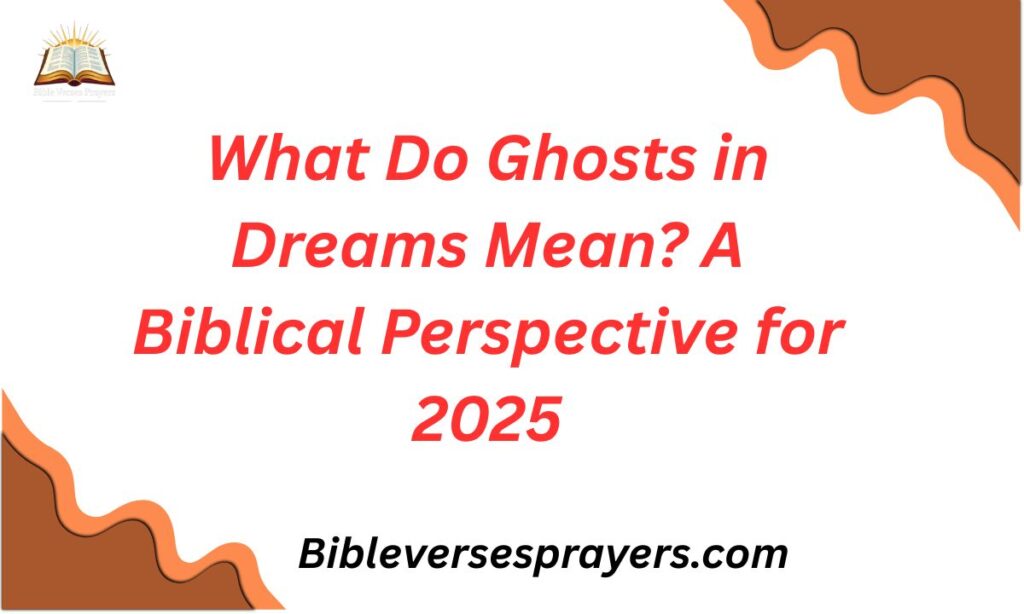In 2025, as spiritual awareness continues to grow, many believers are seeking biblical understanding of supernatural dream encounters.
Dreams involving ghosts can be both fascinating and unsettling, often carrying profound spiritual significance that deserves careful examination through a scriptural lens.
Throughout biblical history, dreams have been God’s chosen method of communication with His people. When ghostly figures appear in our dreams, they might represent unresolved spiritual matters, calls for repentance, or even divine guidance for our life journey.
Understanding Ghosts in Biblical Context
The modern concept of ghosts differs significantly from biblical teachings about spirits and the afterlife. In contemporary culture, ghosts are often portrayed as trapped souls wandering between worlds, but Scripture presents a different understanding.
The Bible doesn’t use the word “ghost” in the way we understand it today. Instead, Scripture speaks of various types of spirits, including the Holy Spirit, human spirits, and demonic entities.
Understanding this distinction is crucial for properly interpreting ghostly dreams from a biblical perspective. When we dream of ghostly figures, we’re likely encountering spiritual symbolism rather than literal deceased persons.
The Bible and Spirits: What’s the Difference?
Scripture presents three primary categories of spiritual beings that might manifest in dreams. First, the Holy Spirit represents God’s presence and power working in believers’ lives, providing guidance, comfort, and spiritual gifts.
Second, human spirits refer to the eternal aspect of human beings that continues after physical death. Third, evil spirits or demons are fallen angels that seek to deceive and harm humanity.
In 1 Samuel 28:3-20, the witch of Endor summoned what appeared to be Samuel’s spirit. However, many biblical scholars debate whether this was truly Samuel or a deceptive spirit, highlighting the importance of spiritual discernment when interpreting ghostly dreams.
Ghosts in Dreams: What Does the Bible Say?
Dreams have played a significant role throughout biblical history as a means of divine communication. From Abraham to the apostle Paul, God has used dreams to reveal His will, provide warnings, and offer encouragement to His people. In the Old Testament, God spoke to Jacob through dreams about his future and the covenant promises.
When ghostly figures appear in dreams, we must evaluate them against biblical principles. Scripture warns against seeking communication with the dead (Deuteronomy 18:10-12), suggesting that genuine spiritual encounters should align with God’s revealed will. Dreams involving deceased loved ones might represent unresolved grief, guilt, or the need for closure rather than actual spiritual visitations.
The Role of Dreams in the Bible
Throughout Scripture, dreams served as divine communication channels for prophets, kings, and ordinary believers. Joseph’s interpretation of Pharaoh’s dreams saved Egypt and surrounding nations from devastating famine (Genesis 41). Daniel received prophetic visions through dreams that revealed God’s plan for world history and the coming Messiah.
In the New Testament, God warned Joseph through dreams about Herod’s plan to kill baby Jesus, leading to the family’s escape to Egypt. The prophet Joel declared that in the last days, God would pour out His Spirit and people would dream dreams (Joel 2:28), suggesting that spiritual dreams remain relevant for contemporary believers.
Biblical Interpretation of Ghosts in Dreams
When interpreting ghostly dreams biblically, we must consider several key factors. Dreams that produce fear, anxiety, or spiritual oppression may indicate demonic influence or areas of spiritual vulnerability in your life. The Bible teaches that God’s Spirit brings peace, not confusion or terror.
Conversely, dreams that bring comfort, peace, or spiritual encouragement might represent God’s reassurance or guidance. Consider the dream’s message or symbolism in light of Scripture, as dreams that encourage biblical values like repentance, forgiveness, or spiritual growth align with God’s character.
Do Ghosts in Dreams Represent the Dead?
The Bible teaches that upon death, human spirits immediately enter their eternal destinations. Hebrews 9:27 states that people die once and then face judgment, suggesting no opportunity for earthly return. In the parable of the rich man and Lazarus (Luke 16:19-31), Jesus illustrated the fixed separation between the living and dead.
Dreams of deceased loved ones likely represent psychological or spiritual symbolism rather than actual visitations. However, God may use the imagery of deceased persons to communicate spiritual truths or encourage reflection on eternal matters.
Common Biblical Themes Associated with Ghosts in Dreams

Several biblical themes commonly appear in dreams involving ghostly figures. First, spiritual warfare often manifests through unsettling ghostly dreams, representing the ongoing battle between good and evil forces. Second, unconfessed sin or guilt may appear symbolically as haunting figures, calling for repentance and spiritual cleansing.
Third, unforgiveness toward others might manifest as disturbing ghostly encounters, highlighting relationships requiring reconciliation. Fourth, fear of death or eternity can produce ghostly dream symbolism, prompting spiritual reflection on your relationship with God.
Spiritual Warfare: Good vs. Evil
The Bible teaches about ongoing spiritual warfare between God’s kingdom and Satan’s domain. Ephesians 6:12 reminds us that our struggle is against spiritual forces of evil in heavenly realms. Ghostly dreams might represent this spiritual conflict, especially when they produce fear, confusion, or spiritual oppression.
Christians have authority over evil spirits through Jesus Christ. When experiencing disturbing ghostly dreams, prayer and biblical confession can provide spiritual protection and peace. Remember that God has not given us a spirit of fear but of power, love, and sound mind (2 Timothy 1:7).
Repentance and Forgiveness
Dreams involving ghostly figures often symbolize the need for repentance or forgiveness in our spiritual lives. King Saul’s encounter with Samuel’s spirit revealed his disobedience to God and the consequences of his rebellion. Similarly, our ghostly dreams might expose areas of spiritual compromise.
Unconfessed sin creates spiritual darkness that can manifest through disturbing dream experiences. The Bible promises that if we confess our sins, God is faithful to forgive and cleanse us. Forgiveness toward others is equally important, as unforgiveness can create spiritual bondage.
Comfort or Confrontation
Not all ghostly dreams are negative or threatening. Some may bring comfort, especially when grieving the loss of loved ones or seeking spiritual encouragement during difficult times. Dreams of deceased family members might represent God’s comfort during mourning.
However, some ghostly dreams serve as spiritual confrontation, highlighting areas requiring attention or change. God’s love is evident in both comfort and correction, and He sometimes uses dramatic dream experiences to guide us toward righteousness.
Interpreting the Biblical Meaning of Ghosts in Your Dreams
Proper interpretation of ghostly dreams requires careful consideration of multiple factors. Begin by examining your current spiritual condition and relationship with God. Consider your emotional response to the dream – fear might indicate spiritual vulnerability, while peace might represent divine encouragement.
Evaluate the dream’s message against Scripture. Any spiritual experience that contradicts biblical truth should be rejected as deceptive. Seek wise counsel from mature believers who can provide biblical perspective and prayer support.
Context Matters
The context surrounding your ghostly dream significantly impacts its interpretation. Consider your current life circumstances, spiritual struggles, and emotional state when the dream occurred. Dreams during times of grief, stress, or spiritual warfare often carry different meanings than those experienced during peaceful seasons.
Pay attention to recurring patterns in your ghostly dreams, as God sometimes repeats messages until we respond appropriately. The timing of ghostly dreams can also be significant – dreams during prayer or spiritual seeking might carry greater weight.
Common Themes to Look For
Several common themes appear in biblically significant ghostly dreams. Fear-based themes often indicate spiritual attack or unconfessed sin requiring prayer and biblical response. Comfort-based themes typically represent God’s encouragement during difficult circumstances.
Warning themes serve as divine alerts about potential spiritual dangers, while reconciliation themes highlight relationships requiring forgiveness or restoration. Recognizing these patterns helps understand God’s message for your life.
Seeking Clarity Through Prayer
When struggling to understand ghostly dreams, prayer is your most important resource. James 1:5 promises that God gives wisdom generously to those who ask in faith. Begin by asking God for spiritual discernment and protection from deceptive influences.
Pray for peace and clarity regarding the dream’s meaning and appropriate response. Consider fasting and extended prayer when seeking understanding of significant spiritual dreams. Join with other believers in prayer for additional spiritual authority and wisdom.
When Ghost Dreams Are Not Biblical?

Not every ghostly dream carries spiritual significance or biblical meaning. Psychological factors like stress, anxiety, grief, or trauma can produce ghostly dream imagery without spiritual significance. Cultural influences from movies or media can shape dream content without spiritual meaning.
Physical factors like medication, illness, or sleep disorders can affect dream patterns. Demonic deception can also produce false spiritual experiences that contradict Scripture. Always test spiritual experiences against God’s Word for authenticity.
Conclusion
Understanding ghostly dreams from a biblical perspective requires careful discernment, scriptural knowledge, and spiritual maturity. These experiences might represent divine communication, spiritual warfare, or calls for repentance and growth. God continues to use dreams as one method of communicating with His people in 2025.
Whether your ghostly dreams bring comfort or confrontation, they serve as opportunities for spiritual growth and deeper relationship with God. Respond with prayer, biblical study, and obedient faith. Trust in God’s goodness and sovereignty as you navigate spiritual dreams, always anchoring your interpretation in His Word.
Frequently Asked Questions
Are all ghostly dreams spiritual in nature?
No, not all ghostly dreams carry spiritual significance. Some result from psychological factors, cultural influences, or physical conditions rather than divine communication.
Can deceased loved ones actually visit us in dreams?
The Bible suggests that the dead rest in God’s hands and don’t return to earth. Dreams of deceased persons likely represent emotional processing or symbolic spiritual messages.
How can I tell if a ghostly dream is from God or demonic deception?
Test the dream against Scripture, evaluate its emotional fruit, and seek wise counsel. God’s Spirit produces peace and biblical alignment, while deception creates fear and contradiction.
Should I be afraid of ghostly dreams?
Christians need not fear spiritual dreams when walking in faith. Prayer, Scripture, and spiritual authority through Christ provide protection against harmful spiritual influences.
What should I do if ghostly dreams become frequent or disturbing?
Increase prayer and Bible study, seek counsel from mature believers, examine your spiritual life for areas needing repentance, and consider whether natural factors might be contributing.






